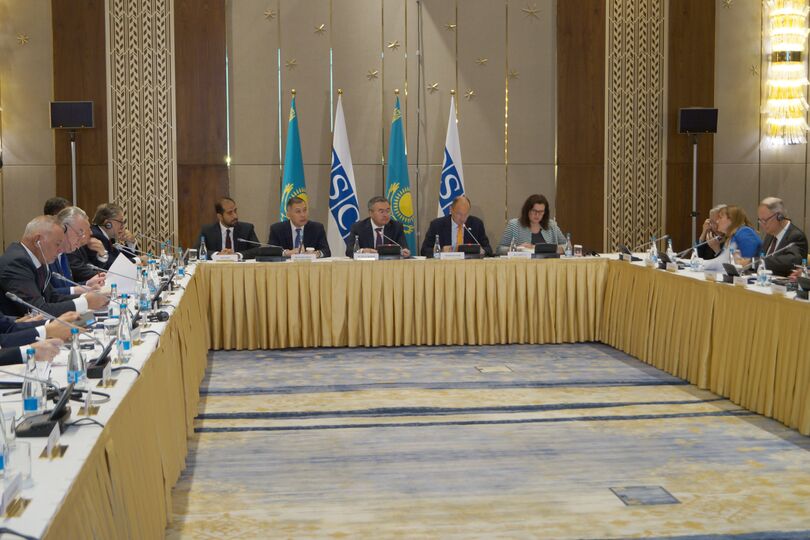On 9 October, 2019, Nur-Sultan hosted a roundtable discussion, "Afghanistan and the OSCE: Fostering Opportunities for Partnership and Cooperation." It was held with assistance from the Foreign Ministry of Kazakhstan.
The meeting opened with a speech by Foreign Minister of Kazakhstan Mukhtar Tleuberdi. He noted the inseparable connection of the future of Central Asia with the peaceful and sustainable development of Afghanistan and emphasised the need to maintain and expand the dialogue between key regional organisations for this purpose. "We believe that durable global and regional partnerships, long-term investment and regional alignment have key significance for ensuring a peaceful future for that country," Mr Tleuberdi emphasised.
The meeting was attended by UN Secretary-General's Special Representative for Afghanistan Tadamichi Yamamoto, UN Secretary-General's Special Representative for Central Asia and Head of the UN Regional Center for Preventive Diplomacy for Central Asia (UNRCCA) Natalia Gherman, Permanent Representative of the Organisation of Islamic Cooperation (OIC) in Afghanistan Huseyin Botsali, ambassadors from the OSCE countries, and Afghan diplomats.
Sherali Jonon, Deputy Secretary-General of the SCO Secretariat, opened the meeting with a welcome address on behalf of SCO Secretary-General Vladimir Norov.
In the message, Mr Norov described the position of the SCO countries on a settlement in Afghanistan, which was outlined in the Bishkek Declaration of the recent SCO summit. He covered the activities of the SCO-Afghanistan Contact Group, including the main provisions of the roadmap adopted in its framework. The roadmap provides for drafting common measures on localising potential terrorist threats in the SCO member countries, training officials from Afghanistan's relevant bodies for countering illegal drug trafficking and providing help on joint infrastructure projects. Mr Norov noted the importance of implementing the SCO Anti-Drug Strategy to prevent the merging of international terrorism with drug trafficking. He expressed willingness to develop dialogue on Afghanistan with all interested regional agencies. Mr Norov emphasised the need to involve Afghanistan in regional infrastructure projects with a view to promoting economic progress and stabilising the situation in the country.
"The recovery of an Afghanistan that is free of terrorism and drug-related crime is impossible without adequate economic measures. The involvement of Afghanistan in the creation of regional transport routes in the context of the alignment of Russia's idea of Greater Eurasian Partnership, the Chinese Belt and Road Initiative and the national strategies of other SCO countries can play an important role in stabilising the situation in Afghanistan," Mr Norov said.
"The Hairatan-Mazar-i-Sharif Railway and the railways between Mazar-i-Sharif and Herat and Mazar-i-Sharif and Peshawar that are in the design stage would create a new transport corridor with access to Indian, Iranian and Pakistani ports. Implementation of these projects will allow Afghanistan to build up its economic potential and increase the revenues of local companies and households, thereby encouraging the growing of alternative agricultural crops," Mr Norov underlined.
The roundtable participants noted the importance of pooling the efforts of international and regional organisations in the interests of Afghanistan, including through contacts between the SCO, the OSCE and the UN Regional Centre for Preventive Diplomacy for Central Asia.
